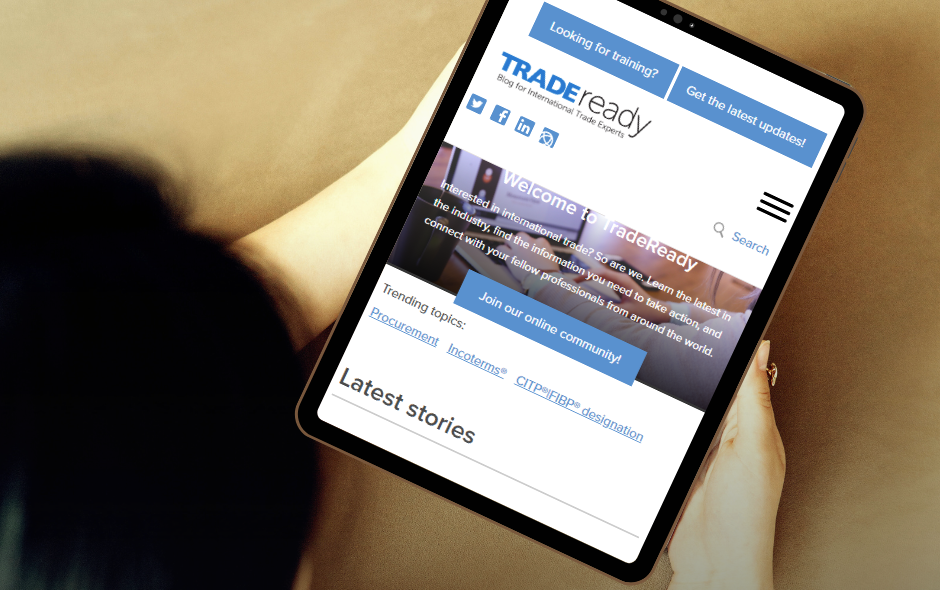
It’s no secret that the international business environment is currently going through a pronounced period of change, politically, geographically, and economically.
Some of this year’s biggest headlines followed trade-related events such as the Brexit and the U.S. presidential election, successful and halted trade deals such as CETA and the TPP and some major currency fluctuations around the world.
All of this change begs the question for businesses of all sizes considering going global for the first time – is now a good time to pursue importing and exporting your products and services?
We decided to pose the same question to some of the most knowledgeable global business professionals in the Twittersphere in our latest #TradeElite chat, and here’s what they had to say.
Moderator: Adrian Mutton (@AdrianMutton) Founder and CEO of Sannam S4 and U.S. Business Centers, based out of Washington D.C. and London, England.
Panelists:
Clarecia Christie, CITP|FIBP (@ClareciaChriste) Project Manager and Team Lead, Trade Information Services at Trade Facilitation Office of Canada, based out of Ottawa, Ontario.
Idalia Obregon (@Idalia_Obregon) Executive Director at Belgian Canadian Business Chamber, based in Toronto, Ontario.
Craig Atkinson, CITP|FIBP (@CraigAAtkinson) Director, International Trade and Development Consulting with Lexmerca, formerly with the ITC, based in Halifax, Nova Scotia.
William Bush (@BillKBush) International Business Consultant, and Professor of US Foreign Policy, International Relations, Emerging Markets, Latin America-Caribbean, based in New York, NY.
Petra Benes (@PetraBenes) Owner of export development company @TopLatinExport, and Partner at Alliance Exports, based in the Netherlands.
Erica A. Murray, PhD (@EricaAMurray) iHeart Syndicated Radio Host, Author, Keynote Speaker, Dr. of Philosophy and International Business Consultant, based in Houston, Texas.
Bernadette Fernades (@On_the_varanda) Founder of the Varanda Network and international development expert, based out of New Brunswick.
Are nations’ imports and exports likely to a) increase b) remain the same or c) decrease with current global politics/economics?
A1 Countries always prefer to export more than to import but some really have to because of economic situation, like Brazil. #TradeElite
— Petra Benes (@PetraBenes) December 8, 2016
A1 there are a lot of variables to consider such as a country’s exchange rate, who are their trading partners #TradeElite
— Clarecia Christie (@ClareciaChriste) December 8, 2016
#TradeElite Despite Brexit and other economic and political developments, countries will increase their exports A1
— William Bush (@billkbush) December 8, 2016
#TradeElite While this economic environment may not be ideal for everyone, it has created the perfect opportunity for Canadian companies A 1
— William Bush (@billkbush) December 8, 2016
@craigaatkinson Are we likely to see a new set of cross border #Trade flows then? #TradeElite
— Adrian Mutton (@adrianmutton) December 8, 2016
@craigaatkinson @adrianmutton strongly agree. Issue is transition measures to cushion impact on protected sectors moving to free trade era
— John Treleaven CITP (@jht4x4) December 8, 2016
We will have to see but some political factors can definitely change the rules, for example with bans towards Russia. #TradeElite https://t.co/E2sZdm3ySj
— Petra Benes (@PetraBenes) December 8, 2016
How much should SME’s be following currency rates, and do they make a big difference to their export prospects?
A2. Currency rates greatly impact #buyerdecision so keep an eye out to determine priorities of where to #export your goods #TradeElite https://t.co/VORcL7BuPD
— bernadette fernandes (@on_the_varanda) December 8, 2016
A2: Both SME/large businesses, esp. those in GVCs, should be following currencies that impact operations and & where opps may be #TradeElite
— Craig A. Atkinson (@craigaatkinson) December 8, 2016
A2. Currency affect B2B transactions: selling price quoted to a buyer in a country where a drop in rates may be a loss to seller #TradeElite
— Clarecia Christie (@ClareciaChriste) December 8, 2016
A2 Currency is of huge importance to SMES, especially with globalized operations. #tradeelite
— ericaamurray (@ericaamurray) December 8, 2016
How aware are SME’s of FTAs (free trade agreements) and do these agreements really impact their import export potential?
A3 #TradeElite #CETA they’re definitely incentives for SME’s, however, its hard for governments to get feedback from SME’s and get…1/2
— Idalia Obregon (@idalia_obregon) December 8, 2016
A3 2/2 #TradeElite #CETA ..and get the right agts, plus is hard for SME’s to get the right info on agts from governments..
— Idalia Obregon (@idalia_obregon) December 8, 2016
A3 Lack of FTA should not be a reason not to/export. Must step up your game and it is then possible to get ahead of competition. #TradeElite
— Petra Benes (@PetraBenes) December 8, 2016
Q3 UNFORTUNATELY, SMES are unaware of FTA, but need to read more data to be well informed #tradeelite
— ericaamurray (@ericaamurray) December 8, 2016
A3. Most SME don’t know FTAs that exist I have had occassion where even an export promotion agency is not aware of one with Cda #TradeElite
— Clarecia Christie (@ClareciaChriste) December 8, 2016
A3 FTAs do facilitate trade but trade will happen with or without them #tradeelite
— Caroline Tompkins (@carolineFITT) December 8, 2016
Has exporting become a)harder b)easier c)much the same in the past 5-10 years? Why or why not?
A4 #TradeElite a)easier because of globalization, however we have new challenges too i.e. security, but we create new rules, we adapt & grow
— Idalia Obregon (@idalia_obregon) December 8, 2016
A4 #exporting is harder with increased competition; easier with FTAs & collaboration; the same cuz no nation is self-sufficient #TradeElite
— bernadette fernandes (@on_the_varanda) December 8, 2016
A4. According to EDC CAD Businesses can expect a 3% growth in exports of goods & services in 2017 @on_the_varanda @FITTNews #TradeElite
— Lynda Arsenault (@LyndaEllenA) December 8, 2016
A4 Its become harder and more difficult. At the same time there easier access to knowledge resources to support SME trade #tradeelite
— Caroline Tompkins (@carolineFITT) December 8, 2016
Will Donald Trump’s policies affect companies’ abilities to import supply chain components to the U.S.?
A.5 @realDonaldTrump will protect US businesses and jobs. Too early to tell what this platform means for the #supplychain. #TradeElite
— Michael Green (@MJGreen0101) December 8, 2016
A1 I agree Bill! Trump’s Trade War with #China & #Mexico provides an opportunity for non-US markets to step up their #exports #TradeElite https://t.co/Ap6IjCuME5
— bernadette fernandes (@on_the_varanda) December 8, 2016
A5 True. In addition to potential #supplychain impacts, we need to how the affects other country’s #trade policies & relations #TradeElite https://t.co/uBnCmClSbv
— bernadette fernandes (@on_the_varanda) December 8, 2016
Good question! I wonder whether @realDonaldTrump himself already has any idea? #TradeElite https://t.co/3OSPS0g2vV
— Petra Benes (@PetraBenes) December 8, 2016
Which countries are best placed to capitalize on global trade trends right now?
A6: As businesses trade, not countries, it is vital that gov ensures an enabling environment for trade #TradeElite
— Craig A. Atkinson (@craigaatkinson) December 8, 2016
I second that however government needs to engage business on expectation for international trade #TradeElite @carolineFITT @craigaatkinson
— Clarecia Christie (@ClareciaChriste) December 8, 2016
A6. I think Mexico could start to open up as I’m reading about how it’s trying to invest in infrastructure. #TradeElite
— audrey ross (@tresAudrey) December 8, 2016
A6 Countries that are positioned to trade #imports & #exports with #EmergingMarkets will see a reciprocal market capitalization #TradeElite https://t.co/3yMDdUIMUy
— bernadette fernandes (@on_the_varanda) December 8, 2016
Will Brexit and other political decisions make importing more restrictive/costly in the future?
A7. #Brexit will make us more creative to continue moving forward #TradeElite
— Idalia Obregon (@idalia_obregon) December 8, 2016
A7: Certain bilateral relationships will change, but multilateral efforts (esp. #Tradefacilitation) will net reduced risk/costs #TradeElite
— Craig A. Atkinson (@craigaatkinson) December 8, 2016
A7 Businesses are now hesitant to make major moves, opting to ’wait and see’… don’t wait, find an #InternationalTrade expert #TradeElite https://t.co/ok0KZl1TGR
— bernadette fernandes (@on_the_varanda) December 8, 2016
Is now a good time to start importing or exporting or both?!
A8 If you have the right strategy and the right people to implement it then its a good time to trade if it is profitable #tradeelite
— Caroline Tompkins (@carolineFITT) December 8, 2016
A8: It depends, but rhetoric is not a reason to dismiss opportunities associated with the promise of global #trade #TradeElite
— Craig A. Atkinson (@craigaatkinson) December 8, 2016
A8. Absolutely. More data available to help you make choices. More funding avail to help small biz get started. #TradeElite
— US Commercial Svc (@USCommercialSvc) December 8, 2016
A8 Now is the BEST time, but do ur homework 1st: do you know where ur buyers are, state of #freetrade agreements/tariffs, etc. #TradeElite https://t.co/8x0CK5Cjfb
— bernadette fernandes (@on_the_varanda) December 8, 2016
Read the rest of the chat and follow future discussions by following the #TradeElite hashtag. Stay tuned for the next #TradeElite chat, coming up Thursday, January 12 at 2:30-3:30PM ET.






disqus comments